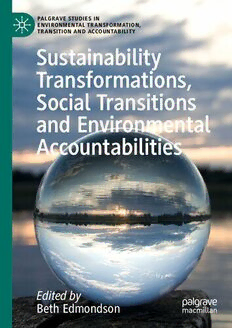Table Of ContentPALGRAVE STUDIES IN
ENVIRONMENTAL TRANSFORMATION,
TRANSITION AND ACCOUNTABILITY
Sustainability
Transformations,
Social Transitions
and Environmental
Accountabilities
Edited by
Beth Edmondson
Palgrave Studies in Environmental
Transformation, Transition and Accountability
Series Editor
Beth Edmondson, School of Arts, Federation University,
VIC, Australia
The monographs and edited collections published in this series will
be unified by interdisciplinary scholarship that considers and interro-
gates new knowledge of opportunities for sustainable human societies
through environmental transformations, transitions and accountabilities.
These publications will integrate theoretical debates and perspectives
in the natural and social sciences with sustained and detailed analysis
of local, regional and international initiatives responding to environ-
mentally driven imperatives such as climate change, fresh water, energy
resources, food security, and biodiversity.
Beth Edmondson
Editor
Sustainability
Transformations,
Social Transitions
and Environmental
Accountabilities
Editor
Beth Edmondson
Trafalgar, VIC, Australia
ISSN 2523-8183 ISSN 2523-8191 (electronic)
Palgrave Studies in Environmental Transformation, Transition and Accountability
ISBN 978-3-031-18267-9 ISBN 978-3-031-18268-6 (eBook)
https://doi.org/10.1007/978-3-031-18268-6
© The Editor(s) (if applicable) and The Author(s), under exclusive license to Springer Nature
Switzerland AG 2023
This work is subject to copyright. All rights are solely and exclusively licensed by the Publisher,
whether the whole or part of the material is concerned, specifically the rights of translation,
reprinting, reuse of illustrations, recitation, broadcasting, reproduction on microfilms or in any other
physical way, and transmission or information storage and retrieval, electronic adaptation, computer
software, or by similar or dissimilar methodology now known or hereafter developed.
The use of general descriptive names, registered names, trademarks, service marks, etc. in this
publication does not imply, even in the absence of a specific statement, that such names are exempt
from the relevant protective laws and regulations and therefore free for general use.
The publisher, the authors, and the editors are safe to assume that the advice and information in
this book are believed to be true and accurate at the date of publication. Neither the publisher
nor the authors or the editors give a warranty, expressed or implied, with respect to the material
contained herein or for any errors or omissions that may have been made. The publisher remains
neutral with regard to jurisdictional claims in published maps and institutional affiliations.
Cover illustration: © Diephosi/gettyimages
This Palgrave Macmillan imprint is published by the registered company Springer Nature Switzerland
AG
The registered company address is: Gewerbestrasse 11, 6330 Cham, Switzerland
Acknowledgements
This book began with a conversation and generously proffered ideas.
Bringing it to publication has provided repeated reminders that appar-
ently serendipitous events and interactions can bring new ideas and
opportunities. While writing, authors and their loved ones have expe-
rienced a host of challenges, disruptions, losses and joys. Some have
experienced long periods of isolation from loved ones. Some have found
themselves writing in hotel rooms for months-long periods—unexpect-
edly caught in transit between their established and new homes. Some
have welcomed new children into their families. Some have buried
loved ones. Some have experienced horrible health challenges. I am both
grateful for and admiring of their determined contributions. There are
a great many reasons to feel optimistic about the future when new
knowledge is so readily shared. It is because of their work, integrity and
grace that this book brings hopes and visions for the future, with due
acknowledgement of current and continuing challenges.
v
vi Acknowledgements
Funding Support Acknowledgements
The research that underpins Chapter 4, Nature, Democracy and Sustain-
able Urban Transformations, is part of a project that received funding
from the European Union’s Horizon 2020 Research and Innovation
Programme under Grant Agreement No 730426.
The research that is considered in Chapter 6, Accountable Solar
Energy Transitions in Financially Constrained Contexts, was funded by
the Research Council of Norway, project number 314022, project name
ASSET (Accountable Solar Energy Transitions).
Beth Edmondson
Contents
1 Sustainability Transformations, Social Transitions
and Environmental Accountabilities: Past and Present
Entanglements 1
Beth Edmondson
2 Evaluating Transformation Means Transforming
Evaluation 15
Michael Quinn Patton
3 The Net-Negative Ethic: Rationalisation and National
Carbon Footprint Programs 39
David Foord
4 Nature, Democracy, and Sustainable Urban
Transformations 79
Sarah Clement and Ian C. Mell
5 Sustainability Transformations and Environmental
Accountability 121
Beth Edmondson
vii
viii Contents
6 Accountable Solar Energy Transitions in Financially
Constrained Contexts 141
Siddharth Sareen, Shayan Shokrgozar,
Renée Neven-Scharnigg, Bérénice Girard, Abigail Martin,
and Steven A. Wolf
7 Overcoming Segregation Problematics
for Environmentally Accountable and Transformative
Policy in a Changing Climate: The Case of Australia’s
EPBC Act 167
Josephine Mummery and Jane Mummery
8 Accountable Environmental Outcomes: Bridging
Disciplinary Traditions on Collaborative Governance,
Coproduction, and Comanagement for Organising
Just and Effective Sustainability Transformations 197
Candice Carr Kelman
9 Navigating Local Pathways to Sustainability Through
Environmental Stewardship: A Case Study in East
Gippsland, Australia 231
Patrick Bonney, Jessica Reeves, and The Community of
Bung Yarnda
10 Tackling the Environmental and Climate Footprint
of Food Systems: How “Transformative” Is the EU’s
Farm to Fork Strategy? 265
Charlene Marek and Jale Tosun
11 Just Transitions in the Context of Urgent Climate
Action 299
Lars Coenen and Bruce Wilson
12 Sustainability Transformations, Social Transitions
and Environmental Accountabilities: Emerging
Opportunities 327
Beth Edmondson
Index 333
Notes on Contributors
Bonney Patrick is a Research Fellow within the Research and Innovation
Capability at RMIT University. His research is located at the intersection
of science, society and environment, with current interest in exploring
the scientific and democratic prospects of citizen science and place-based
research in environmental governance.
Carr Kelman Candice studies collaborative approaches to solving
sustainability problems. Collaborative governance, actionable science,
knowledge coproduction, and community-based conservation are her
key areas of interest. She is clinical faculty at the School of Sustain-
ability at Arizona State University, where she also conducts grant-funded
research through the Center for Biodiversity Outcomes.
Clement Sarah is a Senior Research Fellow at the University of Western
Australia. Her research has two main streams: (1) governance in the
Anthropocene, particularly with respect to biodiversity, climate change
and wildfire, and (2) how the use of nature-based solutions can support
efforts to address social-ecological challenges.
ix

